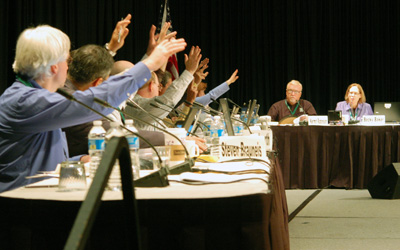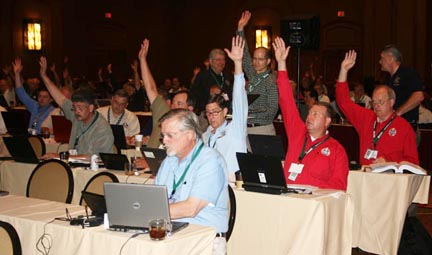
In an effort to create additional opportunities for participation in the ICC Code Development Process, for the 2012/2013 Code Cycle and going forward, the Code Council Board of Directors established four Code Action Committees covering all of the International Codes.
 The CACs – Building (BCAC), Fire (FCAC), Plumbing, Mechanical & Fuel Gas (PMGCAC), and Sustainability, Energy & High Performance (SEHCAC) – are active in the Group A Codes (International Building, Fuel Gas, Mechanical, Plumbing and Private Sewage Disposal Codes) and Group B Codes (Administrative, ICC Performance Code, International Existing Building, Energy Conservation, Fire, Green Construction, Property Maintenance, Swimming Pool and Spa, Residential, Wildland Urban Interface and Zoning Codes).
The CACs – Building (BCAC), Fire (FCAC), Plumbing, Mechanical & Fuel Gas (PMGCAC), and Sustainability, Energy & High Performance (SEHCAC) – are active in the Group A Codes (International Building, Fuel Gas, Mechanical, Plumbing and Private Sewage Disposal Codes) and Group B Codes (Administrative, ICC Performance Code, International Existing Building, Energy Conservation, Fire, Green Construction, Property Maintenance, Swimming Pool and Spa, Residential, Wildland Urban Interface and Zoning Codes).
The CACs were established as part of the Board's efforts to align the Code Council's committee infrastructure with its new three-year code development cycle. The CACs are utilized as discipline specific bodies to act as a forum to deal with complex technical issues ahead of the Code Development Process, identify emerging issues and draft proposed code changes of importance to the membership.
The CACs have held multiple meetings to review the 2012 I-Codes and develop code change proposals for the 2015 editions. Following are status reports:
Building Code Action Committee (BCAC)
The BCAC's specific responsibility is to review Chapters 1-6, 10-13, 15-25 and 27-35 of the International Building Code, Chapters 1-10 of the International Residential Code, and the International Existing Building, Property Maintenance and Zoning Codes. The BCAC roster includes building officials, building professionals and industry code experts. Under the leadership of Chairman Charles Bajnai and Vice Chairman Kenneth Andrews, the BCAC began its work with a kick-off conference call supported by ICC Technical Services staff, followed by three in-person meetings in Chicago and numerous conference calls in-between.
The BCAC has developed and submitted 28 code change proposals for the Group A Code Development Hearings April 29-May 6 in Dallas. All Group A code changes submitted are available on the ICC website by clicking here. The subject matters of the BCAC proposals include:
• Height and area requirements
• Basements in unlimited area buildings
• Pedestrian walkways
• Owner-occupied lodging houses
• Live/work units
• Aisle stairs, aisles and aisle access ways
• Exit and exit access
• Conventional light frame construction fastener requirements
• Structural requirements for temporary structures
• Existing buildings
On March 21-22, the BCAC held its fourth in-person meeting to review Group A code change proposals related to those the committee submitted and to begin the process of drafting Group B code change proposals. Group B codes under the purview of the BCAC include the IRC Chapters 1 – 10, non-structural portions of the IEBC, and the IPMC and IZC. Over the next nine months the BCAC will have two public meetings and several conference calls to develop Group B code change proposals for submission by the January 3, 2013, Group B code change deadline.
The BCAC roster is available here. The staff liaisons are Ed Wirtschoreck, LA, Manager of Standards, and Dave Bowman, PE, Manager of Codes.
Fire Code Action Committee (FCAC)
The FCAC roster includes ICC Members from the International Association of Fire Chiefs (IAFC) – Fire and Life Safety Section Executive Board, the National Association of State Fire Marshals (NASFM), National Volunteer Fire Council and other fire service representatives, building officials and industry code experts. Under the leadership of Chairman Joe Pierce and Vice Chairman Anthony Apfelbeck, the FCAC quickly went to work with a conference call meeting supported by ICC staff from Government Relations and Technical Services. The kick-off conference call was followed by three in-person meetings in Chicago during the fall of 2011 and a March 21-22 meeting this year. There were numerous conference call meetings in-between.
The FCAC was assisted by four Regional Work Groups that met in September 2011. These RWGs are comprised of fire service representatives from the IAFC Divisions, NASFM and members appointed by ICC. The RWG are charged with submitting recommended code changes to the FCAC based on regional issues of concern and also address specific topics as assigned by the FCAC.
The FCAC has developed and submitted 26 code change proposals for the Group A code cycle for the Code Development Hearings April 29-May 8 in Dallas. These changes, which can be viewed by clicking here, relate to:
• Fire protection in vacant buildings
• Addressing nuisance fire alarms
• Firefighter Breathing Air Systems
• Fire protection for historic buildings
• Rooftop Assembly Occupancies
The FCAC roster is available here. The staff liaisons are Bruce E. Johnson, Director of Fire Services, and Scott Stookey, Senior Technical Staff for Business & Product Development.
Plumbing, Mechanical & Fuel Gas Code Action Committee (PMGCAC)
 Under the leadership of Chairman Shawn Strausbaugh and Vice Chairman David Hall, the PMGCAC quickly went to work with a conference call meeting supported by ICC staff. The kick-off conference call was followed by three in-person meetings in Chicago and numerous conference call meetings in-between.
Under the leadership of Chairman Shawn Strausbaugh and Vice Chairman David Hall, the PMGCAC quickly went to work with a conference call meeting supported by ICC staff. The kick-off conference call was followed by three in-person meetings in Chicago and numerous conference call meetings in-between.
The PMGCAC has developed and submitted 92 code change proposals for the Group A Code Development Hearings in Dallas. These changes, which can be viewed by clicking here, relate to:
• Requirements for space-cooling systems for hot climates
• Dryer duct connections to be fastened by short rivets
• Non-water urinal drains to carry drainage from a water supplied fixture
• Lead content of plumbing piping, fittings and faucets reduced to 0.25%
• Prohibiting cleaning of piping using flammable or combustible gasses
The PMGCAC is already busy in 2012 working on the Group B code change proposals that are due January 3, 2013, as well as following its Group A code change and related proposals through the code development process.
The PMGCAC roster is available here. The staff liaisons are Fred Grable, Staff Engineer, Gregg Gress, Technical Staff, and Lee Clifton, Director of Plumbing Programs.
Sustainability, Energy & High Performance Code Action Committee (SEHPCAC)
The SEPHCAC includes a broad range of members with expertise in the International Energy Conservation Code (IECC) and sustainable construction practices reflected in the 2012 International Green Construction Code (IgCC). Under the leadership of Chair Brenda Thompson and Vice Chair Mark Heizer, the SEHPCAC quickly went to work at its kick-off meeting in Chicago in March. The full committee was in attendance as well as numerous interested persons.
The SEPHCAC’s primary focus is the IECC and IgCC and related provisions in the other codes. The IECC and IgCC are Group B codes, requiring code change proposals to be submitted by January 3, 2013. At the March meeting, the CAC reviewed over 90 proposals. Those proposals were classified as 1 – Develop and/or back this idea; 2 – Develop this idea if time allows; or 3 – Do not develop this idea. The CAC classified 54 of the proposals as either 1 or 2.
The SEHPCAC was cognizant of the fact that the IgCC was not published until March 28. It is anticipated that additional proposals for the IgCC will be considered by the CAC at its next meeting.
The SEHPCAC established five task groups to tackle its work. They are:
Energy Task Group 1 – Multiple IECC issues not addressed by task groups 2-4.
Energy Task Group 2 – Building Envelop, Fenestration and Lighting Controls.
Energy Task Group 3 – Cross code issues regarding rooftop installations including solar panels, photovoltaics, vegetative and landscaped roofs.
Energy Task Group 4 – Existing buildings and solar regulations. The task group will fist attempt to create existing building chapters in the IECC and relocate existing provisions to the new chapters. While the specific provisions for existing buildings are only a few, the SEHPCAC anticipates growth in related provisions in the future. If time allows the task group will explore creating a solar energy chapter in the IECC to coordinate the growing regulations of these installations.
The SEHPCAC roster is available here. The staff liaisons are Allan Bilka, Senior Staff Architect, and Kermit Robinson, Senior Technical Staff.